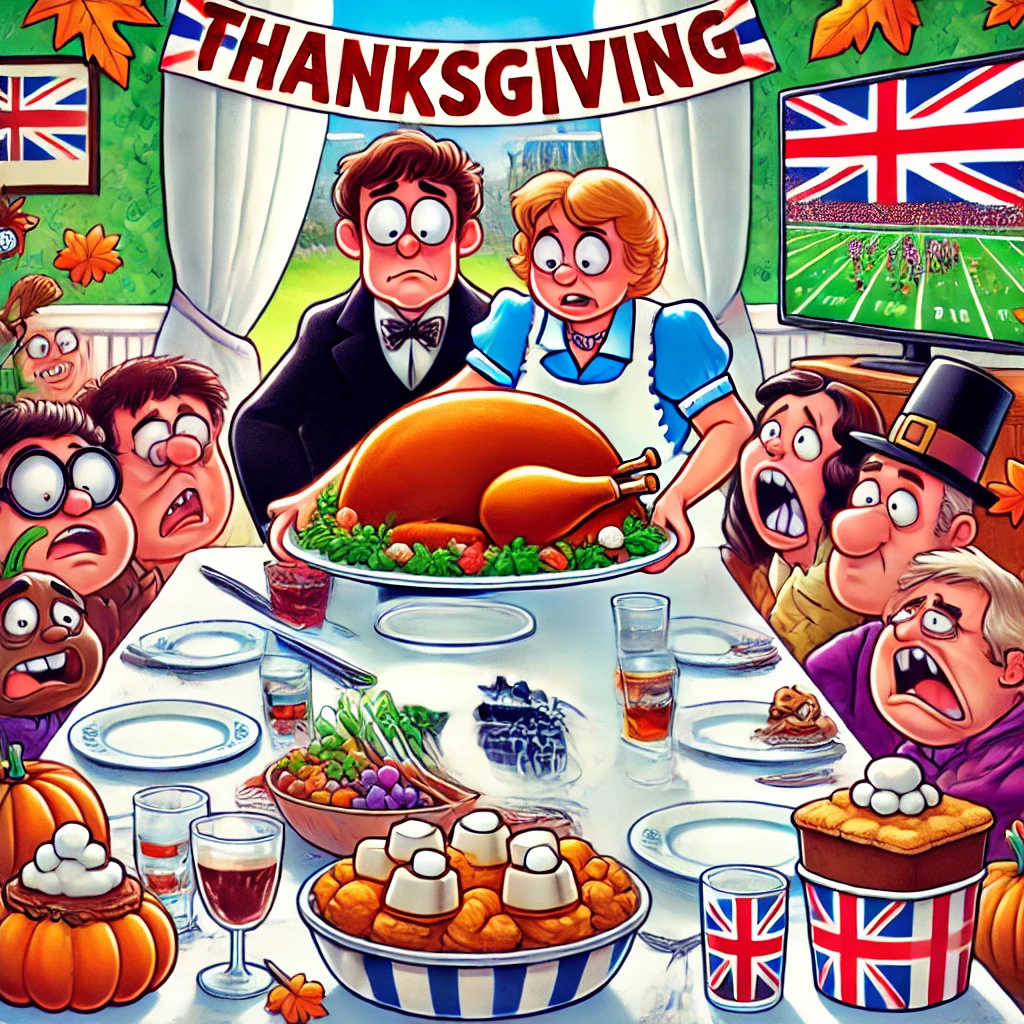As Brits, we’ve all heard of Thanksgiving. It’s that mysterious day in late November when Americans consume mountains of food, shout at football games (not real football, mind you), and argue with relatives they only see once a year. To us, it’s like Christmas, but without presents—and a worrying emphasis on something called yams. But what exactly are they giving thanks for, and why does it seem to involve eating your body weight in turkey? Let’s unpack it from a British perspective.
The Turkey Obsession
We thought we were the kings of unnecessary turkey consumption with our Christmas dinners, but Thanksgiving takes it to a whole new level. The bird is so massive it looks like it’s been bred on steroids, and it’s served alongside about fifteen side dishes, most of which we don’t understand. What exactly is green bean casserole? And why does everyone insist it’s a “must-have” while quietly scraping it into the bin?
Pumpkin: A Dessert or a Vegetable?
Thanksgiving has an inexplicable love affair with pumpkin. There’s pumpkin pie, pumpkin spice lattes, and probably some pumpkin-infused turkey marinade we don’t want to know about. In Britain, pumpkins are purely for carving and leaving to rot on the doorstep until mid-November. The idea of eating one—let alone as dessert—is a cultural leap we’re simply not ready for.
What Even Are Yams?
Apparently, yams are a kind of sweet potato, but the confusion doesn’t end there. They’re smothered in marshmallows, baked, and served as a side dish. To a Brit, this feels like culinary heresy. Marshmallows belong in hot chocolate or on a stick at a campfire, not lounging on a tray next to your turkey. Then again, we do let bread pudding pass as a dessert, so maybe we’re not ones to talk.
The Whole “Giving Thanks” Thing
Here’s the bit we just can’t wrap our heads around. Thanksgiving involves an actual moment where families go around the table and say what they’re thankful for. As Brits, this level of sincerity is frankly terrifying. Imagine trying to say, “I’m thankful for my family” without breaking into awkward laughter or muttering something about how “the roasties turned out alright.”
Black Friday Eve
While Thanksgiving itself is all about gratitude, it’s immediately followed by Black Friday—a gladiatorial free-for-all where Americans trample each other for discounted TVs. For us, it’s like Boxing Day sales, but on steroids. The idea of giving thanks one day and elbowing strangers over a toaster the next feels…oddly human, though.
The Parades and the Pomp
Thanksgiving isn’t just a meal; it’s a spectacle. There’s the Macy’s Thanksgiving Day Parade, complete with enormous balloons shaped like cartoon characters, Broadway performances, and inexplicably cheerful marching bands. In Britain, the closest we get is a small village fete with a bouncy castle and a raffle to win a hamper of biscuits. We’re impressed, America, but also exhausted just thinking about it.
A Day Off to Eat and Nap
What we do envy about Thanksgiving is the idea of a whole day dedicated to eating, drinking, and napping in front of the telly. It’s like a trial run for Christmas without the stress of buying gifts. If we had a day like this in the UK, it would probably revolve around a massive roast dinner and a BBC special about the weather.
What Would a British Thanksgiving Look Like?
If Brits had a Thanksgiving, we’d probably argue about what to serve (turkey? lamb? beans on toast?) and end up with a meal so beige it’d blend into the tablecloth. We’d give thanks for things like “not getting caught in the rain this week” or “finally fixing that dodgy boiler.” The whole thing would be a mix of sarcasm, passive-aggression, and overly dry Yorkshire puddings.
So, while we may not fully understand Thanksgiving, we respect the commitment to overindulgence and family awkwardness. It’s like a warm-up for Christmas, but with extra pie and far more marshmallows. To our American friends: eat, drink, and be merry—we’ll be here with our roasties, quietly judging your sweet potatoes.
Dwight Warner is the quintessential oddball Brit, with a weirdly American-sounding name, who has a knack for turning the mundane into the extraordinary. Hailing originally from London, now living in the sleepy depths of Lincolnshire but claiming an allegiance to the absurd, Dwight has perfected the art of finding the surreal in real life. Whether it’s a spirited rant about the philosophical implications of queueing or a deep dive into why tea tastes better in a mug older than you, his blogs blur the line between the abstract and the everyday.
With an irreverent wit and a penchant for tangents that somehow come full circle, Dwight Warner doesn’t just write; he performs on the page. His humour is both sharp and delightfully nonsensical, like Monty Python met your nosiest neighbour and they decided to co-write a diary.
Known for being gregarious, Dwight is the life of any (real or metaphorical) party, whether he’s deconstructing the existential crisis of mismatched socks or sharing his inexplicable theories about why pigeons are secretly running the economy.
A larger-than-life personality with a laugh as loud as his opinions, Dwight Warner invites readers to step into a world where everything’s slightly askew—and that’s exactly how he likes it.
Discover more from untypicable
Subscribe to get the latest posts sent to your email.
